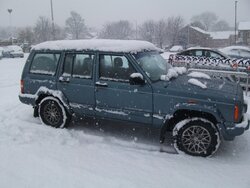Well I'd prefer people erred on the side of caution. Ideally by not going out on the roads at all under snowy conditions, but if they have to then I prefer the ones going unnecessarily slow to those going too fast. The reality is that the last two or three years have been very unusual, for most of my life learning to drive in snow isn't something most people have ever had any need for, there have been hardly any opportunities to practice so I don't really think it is reasonable to expect the majority of drivers to suddenly become skilled at it. Those who want compulsory skid pan training etc, I'm afraid that is largely pointless. Skills based driver training hasn't been shown to be a particularly effective road safety intervention, not least because it doesn't deal with attitudes and can lead to risk-compensation (as a recently returned forummer from Cheltenham will no doubt recall from previous discussions on P&L

).
I think we can all agree that the most effective weapon in the arsenal of road safety is improvements in the construction of vehicles (most people dying on the roads tending to be the occupants of them). The down side of this is the improvements to the structure creating massive blind spots in the vision, and consequentially a lot more SMIDSY's.
From my own experiences of driving in less than perfect conditions, are that less is more, and if any value of self teaching or tuition is of value, is that you do learn to respect the mass and how much of an irresistible force that which inertia is when rolling around on a slippery gradient.
Risk compensation is obviously going to be an issue, but then that will probably be more of one where they might have learned to only respect a variable condition in a controlled environment. I did get caught out last year on a sheet of solid ice/compacted snow (maybe 3" thick) - rolling up to a junction and tapping the brakes lightly to experience a total lock up, and whilst I didn't hit anything, did experience an uncontrollable skid which absolutely gave me a sense of mortality and put my feet firmly on the ground as to what I must consider to be a speed and required stopping distance which is commensurate with the mass of the vehicle in these conditions (I was absolutely kacking it by the time I stopped)
If you don't ever experience this 'oh F*@%' moment in the course of your driving, how can you respect or fear it !
I'd also go further on by saying that all pilots have to practice for the eventuality that they will lose power, or control of their machines (chopper pilots especially), and they are required to give so many hours a year to retain the pilots license doing powerless landings. The value is obviously there, and the cost to the pilot is substantial to keep this experience current. Can you not see the parallels in this and vehicle control on the roads where there are a lot more things to go wrong in terms of terrain, other users in proximity, etc on the roads ?
).




 , according to some on here.
, according to some on here.